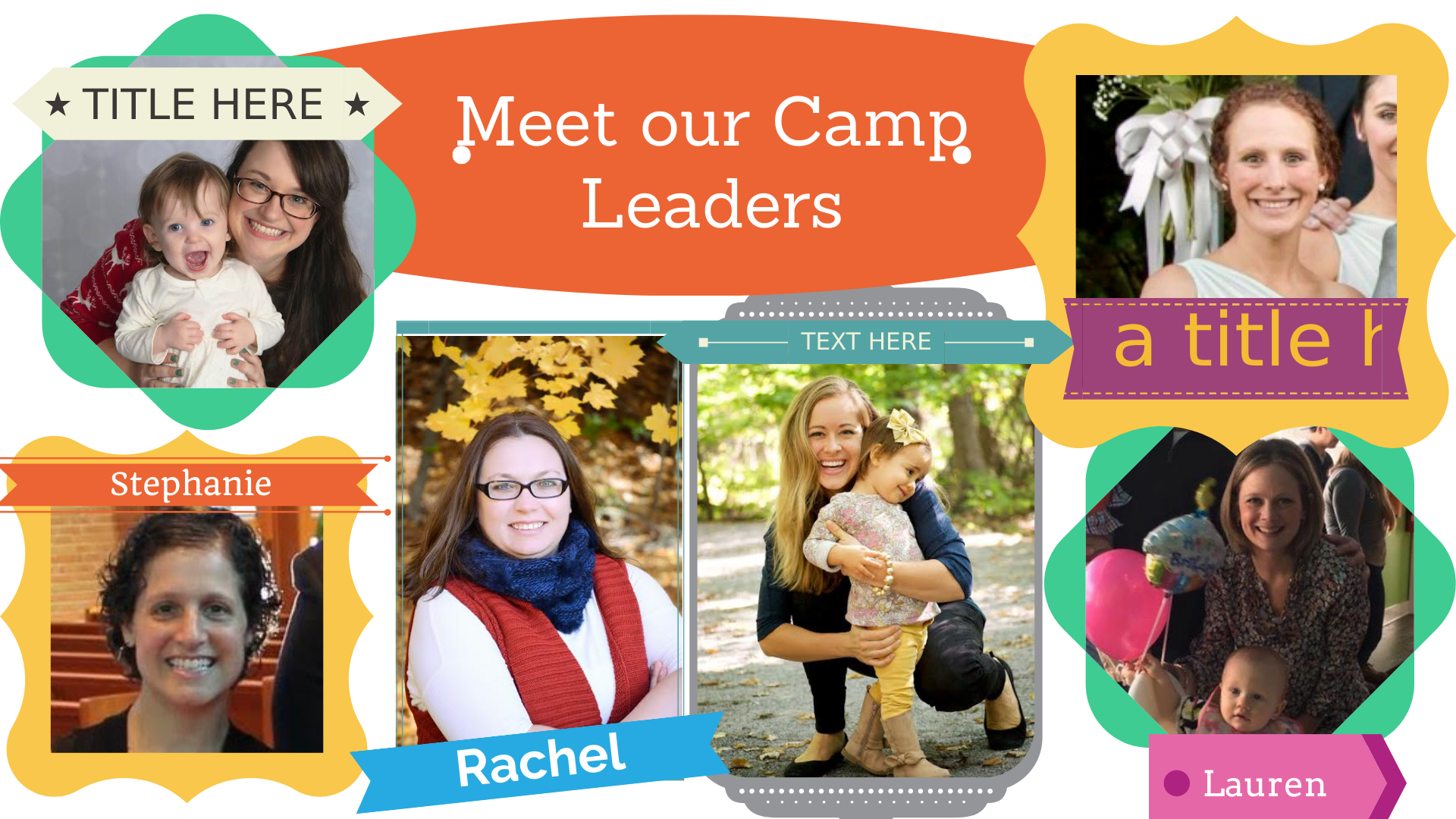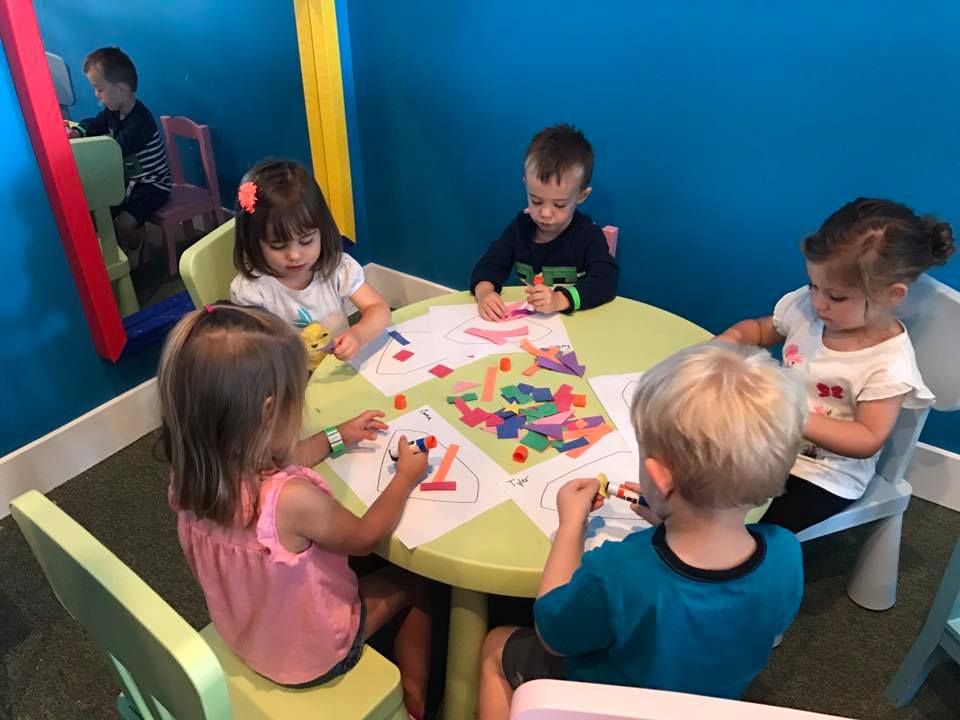10 Tips For Booked-Out Summer Camps At Your Indoor Playground Business!

It may be January right now, but I need to take you ALL the way to summertime. And while it may not feel like summer outside of your window (if you live anywhere that’s similar to New York, where I live), I need you to enter that state of mind right now, at least for the next few minutes. That’s right, we are talking all about summer camps for your indoor playground or play cafe business.
(And by the way, if you prefer to listen, you can hear this same info on my Profitable Play Podcast here).
If you live in an area where drop-off camps during the school off-season are popular, NOW is the time you need to start promoting what you offer. In fact, my 8 year old already has all of his camps chosen and we will be registering by next week. And that’s not uncommon. While I couldn’t find a specific data point on this, speaking from anecdotal experience, when I have looked at options in April and May– EVERYTHING was booked and the waiting lists were even full.
And when I have indoor playground or play cafe business owners come to me and say that camps just haven’t been successful for them, the FIRST thing I ask is when they started promoting them. And like clockwork, they typically say they started promoting around that April or May time frame (maybe even MARCH in some areas)– when everyone already has their summer plans mapped out and is no longer looking.
It’s kind of like the snow thawed and they had their first 60 degree day and they thought, oh SHOOT– my open play and party revenue is about to slow down! I need a plan to make up for that revenue over the summer.
And then they did some googling and threw together a hasty camp schedule and registration page and put it out into the world– only to hear crickets from their customers. And even worse, sometimes they would get 1-2 registrations per camp and end up having to cancel and refund, disappointing their customers, because they would have lost SO much money running the camps with that low of registration numbers.
And if you’re wondering how I crafted that “hypothetical” story with such detail– HI, I’m the problem, it’s me. I did that my first year in business. And spoiler alert– our camps didn’t do so hot. In fact, I only ended up being able to host a couple– and pretty much broke even, despite spending tons of money, time, and energy promoting them a few months prior to summer.
So, the next year- I started my planning process for my summer camp program before the holidays, and I fully launched our camps before January ended. I had my camp leaders hired, I had my marketing assets planned, I had put time and thought into creating an efficient schedule and creating fun themes– and it ended up being a smashing hit that year, and for the remaining years to come.
Now we did make some mistakes which I will share throughout this episode, but we were able to learn from one week to the next and make continual adjustments and tweaks and by the end of that first summer really going all-in on camps, we were running like a well-oiled machine and ready for the next set of campers the following year. But if you never get the chance to actually execute a camp by promoting them too late or without enough strategy– you’ll never be able to make those strides and ultimately reach that place of summer success.
So let’s talk about the planning and promotion of summer camps– then, in Profitable Play Episode 159, we will talk about some tips I have for actually executing the camps so that people leave glowing reviews, share their positive experiences with friends, and continue booking your services.
Alright, here are 10 of my tips for planning your summer camps.
And yes, you better believe we are already sharing and collaborating like CRAZY over in Play Maker Society about camps, so– if you are not yet a member, now is the perfect time to enroll or apply. As a reminder, if you are a Play Cafe Academy student or enroll, you will automatically get invited. If you are a current owner that’s open and operating already and have not taken the course, you can still apply to become a member without it–you can apply right here.
1) Start Promoting Summer Camps Early
I have already said this multiple times, but I really wanted to just hammer it home here and add it to the official list of tips. This article (and this episode) is your sign to STOP putting off summer camp planning and just get it done– it will make filling up your camps SO much easier and will save you from having to overly promote them as you get closer to your first camp date.
Even if you don’t have all the details yet– start planting the seed with your in-person customers and on social media. Start talking about it and posting about it and teasing an upcoming announcement– that will help get people excited to hear your offer.
You can even start a waiting list using a tag and automation on any email service provider– so that when it’s time to release your registration, you already have a set of interested families who will be looking forward to hearing about it!
2) Put Thought Into Your Summer Camp Themes (And Make Them Specific!)
This is going to sound a bit counterintuitive, but after all, MOST things in this industry end up being that way, don’t they? But, my MOST successful camp themes have been the MOST specific and highly targeted.
For example, my first year promoting camps, I tried to do a mix of more specific camps and camps that were more geared towards a general interest. For example, I’d have a Trolls camp (a popular movie at the time) which is more specific, and then I’d throw in a zoo animal camp or something more generalized.
And let me tell you– the highly targeted ones booked EARLY and QUICKLY– and the waiting list booked up as well. We have to remember, even as adults, that many young children HAVE very specific, honed-in interests and passions. And even though these may be ever-fleeting and changing, I have found that tapping into these laser-specific interests to be highly effective– even with something that has to be booked well in advance like a summer camp.

Now I share more details about what each camp entails in terms of snacks, activities, and crafts inside of Play Maker Society, but some of my MOST successful themes have been:
- Princess camp
- Dinosaur camp
- (Insert Popular Movie or Show) camp
- American girl doll camp
- Superhero camp
Some camps that booked OK but not quite as well were
- Mini Picasso camp
- Messy sensory camp
- Little movers camp
Some summer camp themes that flopped were
- Under the sea camp
- Zoo animal camp
- Nature explorers camp
3) Lean Into What Makes YOUR Camps Unique
Now, a probable reason why many of these camps flopped is that our space was just not set up to execute these themes properly. For example, why would someone register their child for an inside water-fun camp and dip their toes in a bucket when they could go to the YMCA down the street and get their kids to slide on a slip n slide all week.
Or why would they sign their sensory seeking kiddo up for a climbing type camp in a space that only had room for one teeny obstacle course.
Once I learned to disregard what everyone else was doing and leaned into what made our space unique, I was able to really gain my footing and start effortlessly selling out my camps.
I would encourage you to whip out your notepad and write down some bullet points about your space and what you could potentially offer that’s different from some of the larger, mostly outdoor camps. And you can also draw inspiration from your other services like parties, as your list of differentiation items will be similar.
If you need some inspiration, here is our list of Positive Unique Qualities of our indoor playground summer camps:
- Small group-size
- All indoor
- Only 3 hours long
- In the afternoon
- Relaxed and controlled environment
- Operated by certified teachers
- Food allergy safe
I was sure to carefully list all of these unique camp qualities on ALL of our marketing materials and pages, not only allowing parents to quickly and easily understand if our camps were of interest to them, but also in helping us come up with themes.
Because we were in a smaller, more controlled, indoor environment- we could do things OTHER camps couldn’t. For example, we could do more intricate crafts like make outfits for the American Girl Dolls.

Or we could have a really peaceful dress-up style tea party at princess camp. Because we had no more than 12-15 campers at a time, we could really put a lot of thought and detail into the itineraries and activities which parents loved and raved about online. We were not a summer camp factory like the YMCA or another big-box company might seem like.
Because we were indoors, our camps were also air conditioned and not weather-dependent. Parents could be confident that their children were safe and contained in a controlled environment and not exposed to the elements and not transferring spaces at any time. Parents sending their children to camp for the first time or who have children who tend to wander (me!) will definitely be attracted to these line-items as they are uncommon.
Safety is HUGE for parents when considering summer camp, so if your space can stand out in that specific area, make it VERY well known and list all of your safety precautions currently taken in your space and any special training your staff may have.
The rest of the line-items speak for themselves, but again I encourage you to create your OWN specific list.
4) Carefully Consider Your Age-Range
Similar to learning into your strengths, be sure to offer camp to ages you feel comfortable accommodating AND can legally do so. Call your local health department to ask about regulations regarding age, length of care per day and week limits, adult to child ratio requirements, and diaper changing regulations to name a few.
You may be very unique if you offer camps for young toddlers and preschoolers since many places do not, but also understand that you will need MORE staff to care for the same number of children in this age range and things like toilet training and changing diapers are things you may not want to contend with.
We generally accepted children OLDER than our typical play-age customer because our camps were structured and had lots of activities other than open play time. We felt confident that we could safely and joyfully occupy children aged 5-8 years of age for 3 hours and give them a great experience even though we typically served younger children.
Also, because we offered open play in the mornings and summer camps in the afternoon, most toddlers and even many preschoolers were napping during our time slots– so we focused mainly on younger school-aged children when designing our themes and activities.
5) Make Registration Easy To Navigate
This is also something I teach in Play Cafe Academy, but registering, paying, and completing all necessary forms online is an essential component of a successful summer camp program.
Requiring parents to email or inquire about offerings, price, availability, or bookings, is just NOT going to allow your business to realize its revenue potential.
Put ALL of the information in an easy-to-read format with bullets and plenty of white space (NO large text blocks) and make it simple for them to choose a date and save their child’s spot.
If a spot is full, make sure your booking software can have a waitlist enabled. According to event booking software RegPack, when a parent who really wants a specific session or time frame sees that the session is sold out or unavailable, they will do 1 of 2 things. They will either select another option that you have available– and that happens about 27.5% of the time according to their data.
The second option is they will open a new tab and search for another local camp that has what they want, and check out that availability and book with that competitor. This happens about 58.2% of the time according to their user statistics. By creating a wait list option you can keep your potential clients on YOUR site longer and lessen that number of people jumping off your site and onto your competition’s site.
6) Set Up Communication Automations
Speaking of registering, make sure you have all of your necessary communication automated as well so parents do not miss out on anything.
For example, when someone registers, they should get a confirmation detailing their order information as well as EVERYTHING they need to know about the camp– including what to bring, any rules or regulations you may have, frequently asked questions, any forms they may need to fill out, etc. Ask them to bookmark this so they can refer to it later.
You can either have all of this information inside of the email OR you can set up a registered campers page on your site– which can act as kind of a catch-all for everything anyone might need to know or do before dropping their child off. This was my preferred method– but either works!
Manually emailing families, however, is the easiest way to ensure something slips through the cracks and it will cause confusion and stress for both the staff and your customer.
Remember, these parents intend to leave their children in your care. Make sure you start the relationship off with them on the right foot and establish trust and professionalism.
7) Offer Early-Bird Discounts Or Waived Registration Fees
Something we added onto all of our marketing materials for our camps (posters, brochures, etc) was a registration fee, which depending on the year was between $25 and $50. The idea behind a once-per-year registration fee is that once a family pays it once, they are incentivized to book more and more weeks of camp because that fee is already paid.
However, between you and I, we never intended to collect any registration fees– and in reality, we rarely did.
That’s because we WAIVED registration fees for anyone who booked before April 1. This helped us book our camp sessions early in the season because the fee was high enough to motivate people to make a decision regarding whether or not they wanted to book, and this worked very well.
8) Consider A Referral Discount
One of our other successful incentives to book was offering those who registered a referral bonus. We used the event booking software Occasion at the time, and Occasion allowed us to send an automated email to registrants giving them a unique referral link.
If someone booked through their referral link, both would get a dollar off amount a future service or a set refund amount that you choose.
Many parents feel more comfortable sending their young children to camp with friends or relatives– someone that’s known to them– so this strategy has many benefits when it comes to boosting your bookings.
Most event booking softwares have some sort of affiliate or referral functionality so take a moment this week to check yours out.
9) Hire Smart
As I alluded to earlier, one of our differentiating factors for our camps was that we hired certified teachers to run them, often with a high-school aged assistant.
We were able to do this because most teachers are off for the summer and looking for part-time work, AND we often allowed them to have their children accompany them to camp depending on their ages.
If you’re worried you cannot afford to fairly pay a certified teacher- consider a mix of an hourly rate AND a barter agreement.
For example, in our indoor playground business we paid our teachers a few dollars above minimum wage AND offered them a FREE yearly play pass for their children. Since many of the people who applied were regular customers anyway– a free year of play was an extremely valuable perk.
And if you’re concerned they will overuse the pass– remember, most teachers work during your busiest hours, so I wouldn’t let that deter you.
While I never recommend asking someone to work for an unfair wage– this really worked for us and most of our camp leaders came back year after year as camp contractors.
Once we made our camp leader selections (we posted a call on social media around the holidays!) we put together bios with photos and fun facts about each camp teacher– including where they teach and what grade.
This helped the parents feel more comfortable registering their children because there was full transparency in terms of who would be in charge and what qualifications they had.

10) Create Great Marketing Assets
In addition to your teacher bios and/or videos, we hung up posters with our camp schedule, made TV graphics, and scheduled dozens of social media posts to go out alongside our other content during the first quarter of the year.
When creating assets, make sure that you again make your differentiation points clear AND make sure everything looks professional and is cohesively branded.
Again, this may seem like a small thing, but it goes a long way in establishing trust with potential clients.
And don’t use stock photos. If this is your first time offering summer camp, use photos from classes or kiddos playing at a party– or even just your space and play area. Parent’s want to see where they will be dropping their kids off in as much detail as possible, so be sure to provide REAL pictures as well as a camp itinerary.
And speaking of camp itinerary– I talk all about executing camps in a way that brings your staff, customers, and campers joy in episode 159 on the Profitable Play Podcast or in this article here!
And if you’d like to join Play Cafe Academy and unlock a free MONTH inside my group coaching and resource membership Play Maker Society, just click here or below! We would love to help you create a profitable and enjoyable summer camp program for your indoor playground or play cafe business!



